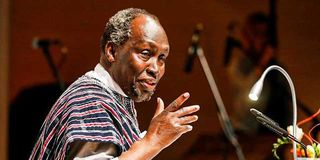Premium
Weep not child: The ‘awokening’ of the sharing and cancel culture

Celebrated Kenyan author and scholar Prof Ngugi wa Thiong’o.
What you need to know:
- Aggrey Ochieng thinks it is reckless for grown African men to castigate or open up negatively about their (octogenarian) fathers on social media.
- Onyango Otieno disagrees, saying that African culture minimises past trauma and that it is okay for men to open up (our daddy wounds) to the world in the 21st century.
The tweet that set the twittering twits talking – or rather the axe that Mukoma wa Ngugi chopped his father with on ‘X’ – fell in the middle of the week, getting all of KOT (Kenyans on Twitter) chattering ...
It isn’t the first time that Mukoma has complained that Nyambura wa Ngugi (the novelist’s first wife) has been ‘silenced’.
Last year, still on Twitter/X, he had moaned that “it hurts to see my late mother being systematically erased from the Ngugi wa Thiongo story”.
But it wasn’t until he said “Ok, I have said it” on this week’s tweet that he really sent the family dirt viral, and broke local social media.
Professor Egara Kabaji, who is on Sabbatical Leave at Daystar University, says he felt uncomfortable upon reading that (Mukoma) comment.
“Where I was born, it is an abomination to get involved in issues between your father and his wife/ wives. At his age, Mukoma ought to know that that is a ‘No Go’ zone,” says the don.
The ‘Woke’ culture, where it has become fashionable or a trend to ‘call out’ social or individual injustice, real or perceived, is now firmly here with us in Kenya. I have known Mukoma wa Ngugi for 20 years, on and off, and was with him at K1 club in Parklands late last year for a local stage rock show in October, where we discussed ‘wokeness’ in the US and Kenya, and persons-of-interest.
Five months later, Mukoma wa Ngugi felt ‘woke’ enough to see social media as a ‘safe space’ where his father’s ‘toxic masculinity’ could be revealed for the whole world to see.
As we all read in The Guardian (Carey Baraka’s story), Ngugi wa Thiongo is not only a very lonely old man (his second wife Njeri was/is in the process of divorcing him) but at 86, is also a very sick man, who needs constant care, with his health ‘cancelling’ his body.
Whatever the case, Aggrey Ochieng thinks it is ‘regerege’ (reckless) for grown African men to castigate or open up negatively about their (octogenarian) fathers on social media. “Let him learn the ways of men in our cultural ways.”
Onyango Otieno disagrees, saying that our (African) culture minimises past trauma and that it is okay for men to open up (our daddy wounds) to the world in the 21st century.
Alex Musau is, however, very annoyed that actions like Mukoma’s can lead to social censure. “It seems trendy to cancel old folks, but the same case is not applicable to the Mukomas of the world. Many who support him are against his being ‘censored’ on social media. They say he should neither be silenced or shamed. But it is okay to shame or even ‘cancel’ old men for ancient sins? I’m not boarding this Double Standard ‘woke’ nonsense.”
On the back of the #MeToo and ‘Black Lives Matter’ movements in the mid-to-latter part of the 2010s decade, ‘Cancel Culture’ – a weaponised ‘woke’ where an individual, brand, group or even nation (like Russia after its Ukraine invasion) is censured, sanctioned and boycotted for bad behaviour – became so big that by 2019, ‘Cancel Culture’ was Australia’s phrase of the year.
Veteran editor Ted Malanda is clear on his opinions when it comes to ‘sharing’ these personal ‘family’ matters on social media:
“My problem is that you transfer your trauma to other people who are not ‘stakeholders’ and who have their own (things) to deal with. So now I’m sitting here, trying to drink a cold beer and think about how to solve my immediate and gargantuan problems. And suddenly I am confronted by Mukoma’s old daddy issues? What are we supposed to do to help you?”
Jacob Aliet, the author of the local bestseller Unplugged, is even more brutal on this matter.
“So your dad is your idol. He is famous and accomplished. He supports you, schools you and even helps your career take off by giving you a platform and he praises your talent and he encourages you. People buy your books because of his pedigree even though nobody knows whether you’re half as talented as him. When he is old, weak and dying, you fabricate indignation and come out one day to tell us that you suddenly recalled childhood memories about him beating up your mother who died a long time ago. This cannot unbeat your late mother but at least it gets you attention. Nice. Very classy.”





